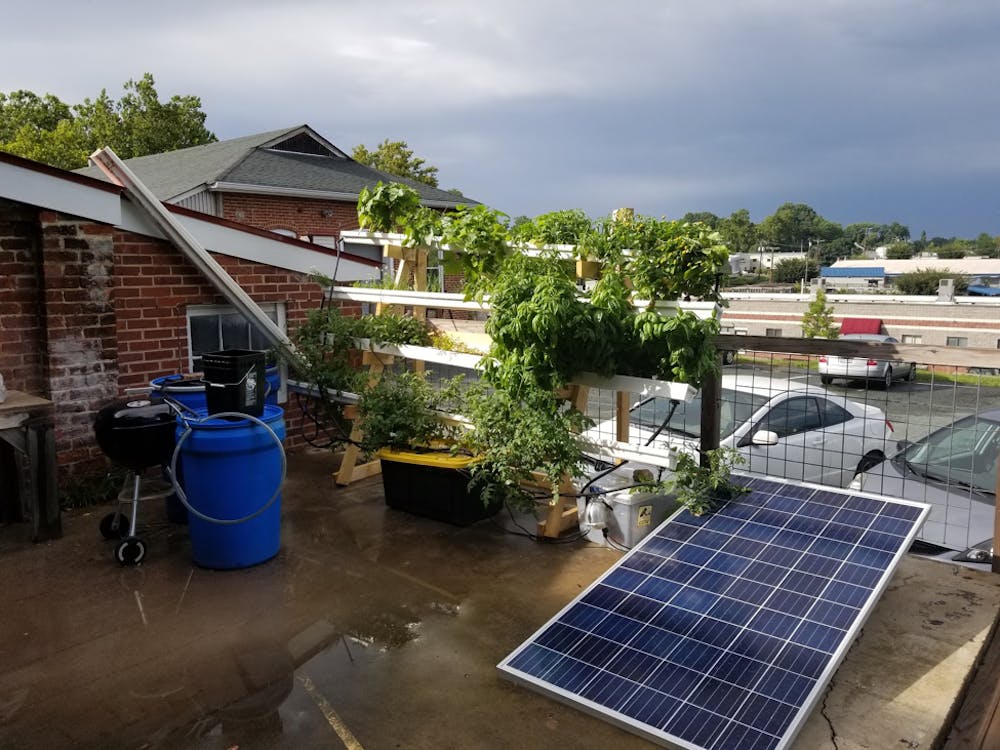Babylon Micro-Farms, founded by University alumnus Alexander Olesen during his undergraduate years, has developed a system using hydroponic farming to make growing fresh produce sustainable for the urban consumer. The Babylon team has recently installed more apparatuses in the University dining halls, Charlottesville businesses and consumers’ homes.
Olesen developed Babylon Micro-Farms, a hydroponic farming system, to create an urban farming system easily accessible by consumers. During the spring semester of 2016, in the early stages of the company’s development, Olesen utilized several entrepreneurship resources available through the University.
“We started with the social entrepreneurship class, but then the founders went through the HackCville Alpha program, which was very helpful for them,” said Will Graham, the director of sales and marketing at Babylon. “From there, they went through the Darden iLab.”
In hydroponic farming, plants are grown in nutrient-rich, water solvent mineral solutions rather than in soil. This farming method removes environmental limitations to maximize respiration and absorption of nutrients in plants, which contribute to a greater harvest yield. Genetically modified organisms, pesticides or inorganic fertilizers cannot be used in a hydroponic culture.
Moreover, hydroponic farming can help reduce the distance between where a food item is grown and where it is sold by allowing plants to grow in normally inhospitable environments, such as inside urban buildings. This system could potentially allow restaurants and homes to grow plants inside their own spaces.
Since hydroponic systems are generally used in mass production due to their high cost, they are not readily available for urban consumers performing small-scale farming. Hydroponic systems also usually have restrictions on the types of plants that can grow in them.
However, Babylon Micro-Farms seeks to make hydroponics available for personal use and has developed technology that allows consumers to grow several different types of plants in their systems.
According to Graham, the Babylon team has several types of systems with varying degrees of technology. Some of the systems have two different reservoirs to allow different types of plants that require different types of nutrients or stratified sections of the same crop to grow on the same system.
The farming system has several versions which were developed throughout the growth of the company. Initially, the systems could not monitor the growth of the plants on each rack and were not stratified enough to grow multiple different types of produce on the same apparatus. Now, racks are divided based on the type of plant and can also be scanned into an app, which displays available information and data from the hydroponic system.
“You should able to scan a farm and tell it where you're putting plants, and it can adjust the lights and nutrients to grow something,” Graham said.
The Babylon team began testing prototypes around Grounds in 2017 after building an early model through HackCville, and received funding by winning $6,500 from the Green Initiatives Funding Tomorrow grant. After earning the GIFT grant, the company utilized the resources of Darden’s iLab, or the W.L. Lyons Brown III Innovation Laboratory — which supports the growth and development of business at an early stage by providing them resources, such as funding opportunities, legal services and faculty support.
According to Patrick Mahan, an electrical engineer at Babylon, the resources at the iLab helped the Babylon founders navigate the process of establishing a business.
After obtaining a financial basis for the project, the Babylon team installed their micro-farms in dining halls at the University. At Newcomb and O’Hill, these systems are utilized to grow produce used to prepare meals. On Sept. 12, the Babylon team installed two new systems in O’Hill and Runk.
"We mostly got positive reception,” Mahan said regarding the placement of systems in dining halls. “Part of it was almost confusion because they had never seen anything like it before, so they weren't sure what it was doing. But once they saw the plants start growing and saw the workers harvest the plants, I think they came around to it.”
Although Babylon is still installing systems in O’Hill and Runk, the team is also working on creating new technologies. Currently, they are developing a solar powered farm at the Morven Farm with the Morven Kitchen Garden.
The Morven Kitchen Garden, similar to Babylon Micro-Farms, is part of a student-run undergraduate sustainability initiative, according to Morven Kitchen Garden manager Stephanie Meyers. Students manage a community-supported agriculture program on a one-acre sustainable garden, donated by philanthropist John W. Kluge.
In addition to the project with Morven, the company is expanding their work outside the University. The Babylon team has implemented their hydroponic systems in Boar’s Head Resort and Three Notch'd Craft Kitchen & Brewery, two local businesses a few miles away from Grounds.
Babylon has also provided prototypes for personal use in the home, which are being used to further develop a hydroponics system available for purchase by local consumers.







